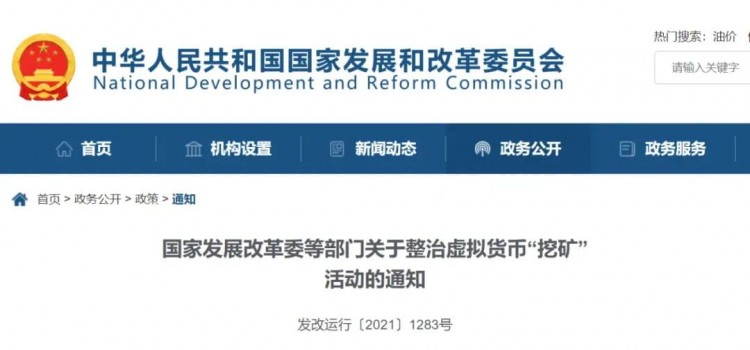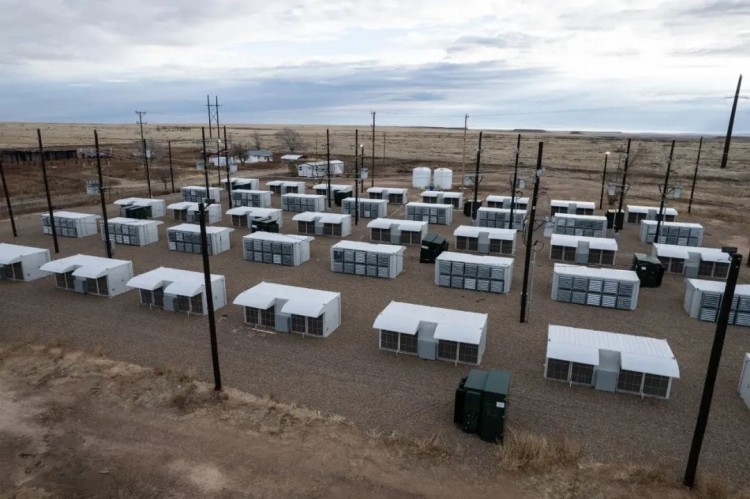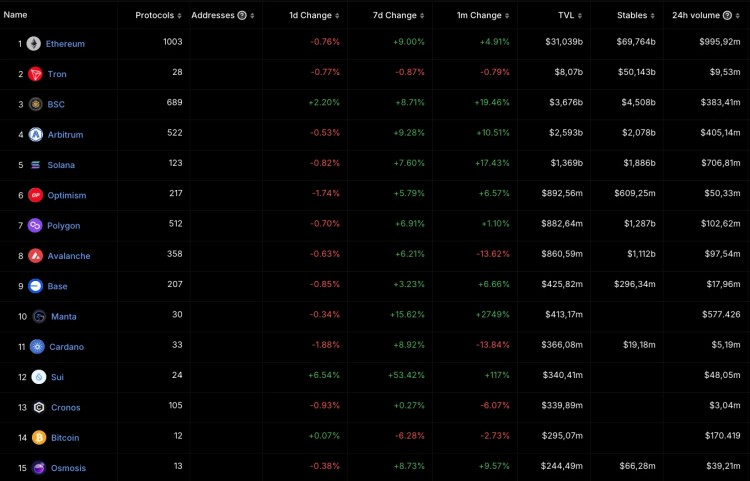时间:2024-02-20|浏览:337

用戶喜愛的交易所

已有账号登陆后会弹出下载
01
——Notice on rectifying “mining” activities——
China's Bitcoin mining volume once accounted for two-thirds of the global total.
From September 2019 to April 2020, Chinese miners accounted for more than 71% of the total network computing power. Abundant and cheap electricity and hardware equipment have made China a popular destination for cryptocurrency companies.
Earlier, Bitcoin mining was mainly concentrated in Sichuan Province, Inner Mongolia Autonomous Region, Xinjiang Uygur Autonomous Region, Yunnan Province and other regions, and these provinces are rich in power resources and low prices.
On April 14, 2021, the price of Bitcoin once reached a historical high of approximately US$64,870 per coin. However, just over a month later, the price of the world’s most popular digital currency plummeted to $34,259.
The plunge in Bitcoin prices in a short period of time is closely related to the Chinese government’s remedial measures against virtual currency “mining” activities. An important reason behind the plunge in Bitcoin prices is that China has begun a comprehensive crackdown on the cryptocurrency industry out of concerns about related financial risks and excessive energy consumption. The process of Bitcoin "mining" is very energy-intensive, and the machine-specific integrated circuits (ASICs) used to mine Bitcoin consume a large amount of energy.
In May 2021, China announced at a State Council meeting that the Chinese government planned to “crack down on Bitcoin mining and trading.” Subsequently, local governments acted quickly, revoking the licenses of companies involved in cryptocurrency mining, cutting off power to mining facilities, and even giving some companies only 7 days to shut down their operations. By the end of June, 90% of China’s Bitcoin mining centers had gone offline.
In September 2021, the National Development and Reform Commission and other departments issued a notice on rectifying virtual currency "mining" activities, classifying virtual currency "mining" activities as a phased-out industry, and strictly prohibiting virtual currency "mining" in the name of data centers. Mine” activity.
Since then, Bitcoin miners with nowhere to go have been looking for a suitable home for their machines around the world. Chinese Bitcoin mining companies quickly moved operations to countries such as the United States, Canada, and Kazakhstan.
02
——Texas Channing Mine————
A large number of Chinese investors have moved to the United States to invest, spending hundreds of millions of dollars to build or operate cryptocurrency mines. The US state of Texas was the first to open its doors to cryptocurrency businesses. The state’s governor wants Texas to become the new global center for Bitcoin mining. Shenzhen, China-based BIT Mining is also investing $26 million in a 57-megawatt facility in the state.
According to the New York Times, Chinese-owned or operated Bitcoin mines have been discovered in at least 12 states in the United States, including Arkansas, Ohio, Oklahoma, Tennessee, Texas and Wyoming. They consume as much energy as 1.5 million homes.
However, starting in 2022, several Chinese-operated Bitcoin mines were exposed in the media, which not only raised concerns about the impact of the U.S. government on the energy system, but also raised concerns about national security.
In 2022, when a Chinese-backed company broke ground for cryptocurrency mining in Cheyenne, Wyoming, a Microsoft team assessing national security threats sounded the alarm.
The mine is adjacent to a Microsoft data center that supports the Pentagon and just 1.6 kilometers from an Air Force base that controls intercontinental ballistic missiles carrying nuclear weapons.
The location would allow the Chinese to "conduct a full range of intelligence-gathering operations," the Microsoft team wrote in an August 2022 report to the Committee on Foreign Investment in the United States, a federal agency tasked with monitoring threats from overseas investors. mechanism.
Microsoft's warning did not go unanswered. The U.S. government is said to have been tracking Wyoming's actions ever since.

Then, the case of Yu Jierui, a 23-year-old "second generation" international student at New York University, brought the case of Chinese companies opening cryptocurrency mines in the United States into the spotlight.
According to the New York Times, Jerry Yu owns a little-known cryptocurrency mine worth 6 million yuan in a small Texas town. However, he sued the mine because the contractor could not receive payment. Yu Jerry’s identity and The method of transnational wealth transfer was unexpectedly exposed.
Jerry Yu lives a complete "second generation rich" life in the United States. The shared apartment he lives in in Manhattan, New York, was bought for $8 million. He then bought the majority of the shares in the Channing cryptocurrency mining farm in Texas for $6 million. Rather, these transactions are conducted through cryptocurrencies rather than banks. The transaction process is not only anonymized, but also bypasses overseas transfers to prevent anyone from knowing the source of the cash flow.
Such highly confidential transactions allow Chinese investors to avoid the U.S. banking system, avoid supervision by federal authorities, and bypass China's various control measures on capital outflows.
The contractors employed by Yu Jereh's company filed a series of lawsuits because they could not receive payment. It was only after the exposure of various information that Yu Jereh's methods of transferring wealth across borders became known to the outside world.
The Channing Mine is built on a spacious open space, with dozens of buildings, storing 6,000 specialized computers, and conducting Bitcoin mining 24 hours a day and night. The investment record in Jerry Mining can only be traced to the cryptocurrency trading platform Binance, and the transaction was completed overseas through Tether.
After these Chinese Bitcoin mines were exposed in the United States, the days of silent money printing in the past have gradually become difficult to rest. As a result, another major migration of China's Bitcoin mining farms has begun to brew.
03

———A new “shelter” for Bitcoin miners————
Finally, on the other side of the world, Chinese Bitcoin miners found a new “sanctuary” – Ethiopia.
Cheap electricity and friendly relations with China have made this "Horn of Africa" country the first choice for Chinese Bitcoin miners.
Last spring, cargo containers began showing up near the electrical substation connected to the recently built Grand Ethiopian Renaissance Dam, Africa's largest. Inside are a bunch of powerful, energy-hungry computers.
This sign shows that Chinese Bitcoin mine owners have arrived in the "Horn of Africa." Chinese Bitcoin miners have been running from country to country in search of cheap power and lax regulations since the Chinese government kicked them out of the country in 2021.
Buffed by political and economic headwinds, China's bitcoin miners are attracted by some of the lowest electricity costs in the world and an increasingly friendly government.
Although Ethiopia still bans cryptocurrency trading, the country has allowed Bitcoin mining since 2022.
Ethiopia has strengthened ties with China over the past decade, with several Chinese companies helping build a $4.8 billion dam from which miners plan to harvest electricity.
For all companies mining raw cryptocurrencies, Ethiopia has become a rare opportunity, but also a risky gamble.
Ethiopia’s low electricity rates and current government’s surprising embrace of Bitcoin mining have certainly made the country an unexpected haven for cryptocurrency companies.
As the global Bitcoin mining industry faces growing criticism for its energy-intensive practices, Ethiopia has emerged as a surprising oasis, offering a rare opportunity for cryptocurrency companies grappling with growing concerns about climate change and power shortages. Breathing opportunity. For Chinese companies that were once giants in the field of Bitcoin mining, Ethiopia’s warm embrace with open arms also provides an opportunity for Chinese Bitcoin mining companies to regain their dominant position.
However, this bold move by Chinese companies is not without risks. Just imagine, almost half of the population in Ethiopia does not have access to electricity, and industrial electricity consumption is far from reaching full capacity, which makes Bitcoin mining a sensitive and delicate topic after all.









